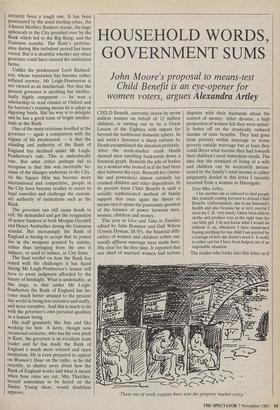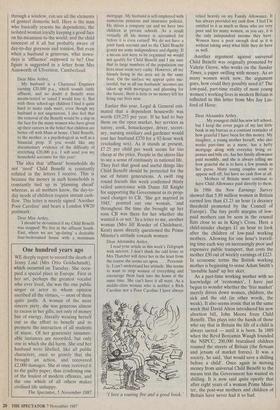HOUSEHOLD WORDS, GOVERNMENT SUMS
John Moore's proposal to means-test Child Benefit is an eye-opener for
women voters, argues Alexandra Artley CHILD Benefit, currently drawn by seven million women on behalf of 12 million children, is turning out to be a Great Lesson of the Eighties with impact far beyond the traditional domestic sphere. In last week's Spectator a sharp cartoon by Heath encapsulated the situation prefectly. After the stock-market crash Heath showed men tumbling backwards down a financial graph. Beneath the pile of bodies lay a woman who looked as if she had been shot between the eyes. Beneath her (invisi- ble and powerless) almost certainly lay crushed children and other dependents. In its present form Child Benefit is such a socially sophisticated method of family support that once again the threat to means-test it opens the passionate question of the balance of power between men, women, children and money. This year in Give and Take in Families edited by Julia Brannen and Gail Wilson (Unwin Hyman, £8.95), the financial diffi- culties of women and children within out- wardly affluent marriage were made horr- ibly clear for the first time. It reported that one third of married women had serious disputes with their husbands about the control of money. After divorce, a high proportion of women felt they were actual- ly better off on the drastically reduced income of state benefits. They had gone from poverty within marriage to worse poverty outside marriage but at least they could direct what income they had towards their children's most immediate needs. The idea that the standard of living of a wife and children can be accurately means- tested by the family's total income is rather poignantly denied in this letter I recently received from a woman in Harrogate:
Dear Miss Artley,
I for another am so relieved to find people like yourself coming forward to defend Child Benefit. Unfortunately, due to my husband's health and also because he is very careful I need my C.B. very much. I have been able to clothe and produce toys at the right time for our little girl. I do not know what I would do without, it, as, whenever I have mentioned buying anything for our child I am greeted by a barrage of how she doesn't need it. It really is rather sad but I have been helped out of an impossible situation.
The reader who looks into this letter as if through a window, can see all the elements of genteel domestic hell. Here is the man who basically resents his dependents; the isolated woman loyally keeping a good face on his meanness to the world; and the child innocent of it all but probably aware of day-to-day greyness and tension. But even when a husband is generous, what nowa- days is 'affluence' supposed to be? One figure is suggested in a letter from Mrs Ainsworth of Ulverston, Cumberland:
Dear Miss Artley, My husband is a Chartered Engineer earning £20,000 p.a., which sounds fairly affluent, and no doubt if Benefit were means-tested 'or taxed I would lose it. But with three school-age children I find it quite hard to make ends meet, even though my husband is not ungenerous. I also feel that the removal of the Benefit would be a slap in the face for the many women who have given up their careers in the belief that children are better off with Mum at home. Child Benefit, to the mother, is a psychological as well as a financial prop. If you would like any documentary evidence of the difficulty of stretching £20,000 p.a. I will send you my household accounts for this year!
The idea that 'affluent' households do not 'need' Child Benefit is constantly refuted in the letters I receive. This is because the money in such households is constantly tied up in 'planning ahead' whereas, as all mothers know, the day-to- day needs of children require instant cash- flow. This letter is merely signed 'Another Poor Caroline' and bears a London SW20 postmark:
Dear Miss Artley, I should be devastated if my Child Benefit was stopped! We live in the affluent South- East, where we are 'up-dating' a desirable four-bedroomed house with a maximum mortgage. My husband is self-employed with numerous pensions and insurance policies. He drives a company car and we have two children at private schools. As a result virtually all his money is accounted for before it is even earned! We do not have a joint bank account and so the Child Benefit grants me some independence and dignity. If a means test were to be organised we would not qualify for Child Benefit and I am sure that to large numbers of the population our lives must seem very cushy. However, all my friends living in the area are in the same boat. On the surface we appear quite suc- cessful, but as all our husbands' incomes are taken up with mortgages and planning for the future, there is little or no money left for living our lives now.
Earlier this year, Legal & General esti- mated that a dependent housewife was worth £19,253 per year. If he had to buy them on the open market, her services as nanny, cook, housekeeper, driver, secret- ary, nursing auxiliary and gardener would cost her husband £370 for a 92-hour week (excluding sex). As it stands at present, £7.25 per child per week seems far too cheap at the price. People in the shires like to see a sense of continuity in national life. They feel that good and useful things like Child Benefit should be protected for the use of future generations. A swift ring round friends this week confirmed thinly veiled annoyance with Dame Jill Knight for supporting the Government in its prop- osed changes to CB. 'She got married in 1945,' pointed out one woman, 'and throughout the time she brought up her sons CB was there for her whether she wanted it or not.' In a letter to me, another woman (Mrs Jill Roeder of Chislehurst, Kent) more directly questioned the Prime Minster's attitude towards women:
Dear Alexandra Artley,
I read your article in this week's Telegraph with interest. I don't think the odd letter to Mrs Thatcher will deter her in the least from the course she seems set upon. . . . Personal- ly, I can't understand her attitude. She seems to want to strip women of everything and encourage them back into the home at the same time. She can't have it all ways. As a middle-class woman who is neither a Rich Caroline nor a Poor Caroline I have always `I love a roaring fire and a good book.' relied heavily on my Family Allowance. It has always provided my cash flow. I feel I'm entitled to it as much as those who are very poor and for many women, as you say, it is the only independent income they have. Women have a poor enough deal as it is without taking away what little they do have as well.
Another argument against universal Child Benefit was originally promoted by Valerie Grove, who works on the Sunday Times, a paper swilling with money. As so many women work now, the argument goes, how could they possibly need it? The low-paid, part-time reality of most young women's working lives in modern Britain is reflected in this letter from Mrs Joy Lin- ford of Hove:
Dear Alexandra Artley,
. . . My youngest child has now left school, but I keep the cover pages of my last little book in my bureau as a constant reminder of how grateful I have been for this money. My daughter, a young mother herself, who also works part-time as a nurse, has a hefty mortgage along with everyday living ex- penses and bills etc, has her family allowance paid monthly, and she is always telling me how grateful she is to have a few pounds in her purse. Many young couples seem to appear well off, but have no cash flow at all. . . . Mothers of Britain must continue to have Child Allowance paid directly to them.
In 1986 the New Earnings Survey showed that 5.89 million women in Britain earned less than £3.25 an hour (a decency threshold promoted by the Council of Europe). The tiny profit margins of low- paid mothers can be seen in the council flats close to us in King's Cross. Here a child-minder charges £1 an hour to look after the children of low-paid working mothers. Allowing for one hour's travell- ing time each way on increasingly poor and expensive public transport, that costs the mother £50 out of weekly earnings of £123. In economic terms the British working mother is beginning to sense Adam Smith's `invisible hand' up her skirt.
As a part-time working mother with no knowledge of 'economics', I have just begun to wonder whether the 'free market' merely drives down women, children, the sick and the old (in other words, the weak). It also seems ironic that in the same week that David Alton introduced his new abortion bill, John Moore froze Child Benefit. This plays into the hands of those who say that in Britain the life of a child is always sacred — until it is born. In 1889 when the Revd Benjamin Waugh founded the NSPCC, 200,000 brutalised children roamed the streets of Britain (the flotsam and jetsam of market forces). It was a society, he said, 'that would save a shilling before a child'. Once again in moving money from universal Child Benefit to the means test the Government has wasted its shilling. It is now said quite openly that after eight years of a woman Prime Minis- ter, the post-war mothers and children of Britain have never had it so bad.



































































 Previous page
Previous page